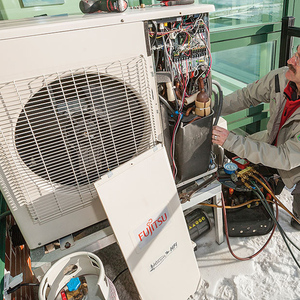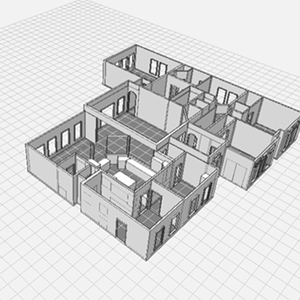I’m building a house that has a lot of structural steel in it. I’d like to learn how to do this myself and get certified in the process. Anybody know the quickest route to accomplishing this?
Also, when I’ve had people do structural welding for me in the past, I’ve always had to pay a special inspection company to have someone sit around while the onsite welding was done. Is there a way to avoid this? I have an engineer guy who could inspect post work. Would he be able to sign off on the welds?
I realize I could get the answers to these questions by contacting the appropriate sources but it’s Saturday, (non-work day), and I thought someone on here might know the answers. I’ve got a bug in my head that it’s something I really want to do. Thanks.
I’m in California, by the way.



















Replies
you know you going to get the comunnity college answers, and a couple years of hands on expreinces.
Also, when I've had people do structural welding for me in the past, I've always had to pay a special inspection company to have someone sit around while the onsite welding was done. Is there a way to avoid this? I have an engineer guy who could inspect post work. Would he be able to sign off on the welds?
Most welding inspectors are certified by the AWS, a state board ( in Washington, the Washington Association of Building Officials (WABO)), following standard industrial criteria, sometimes the ASME, Hartford Steam Boiler, Factory Mutual, or another source. Just being an engineer does not normally qualify one to "sign-off" a weld.
Whether an inspector is required to watch the weldor, and just inspect the weld after the fact is a function of the type of weld specified. An 100% full penetration weld generally will require confirmation of the process. A simple fillet weld can be inspected after completion, and the inspector will need proof that the weldor is certified in that process.
Welding process can involve the type of filler metal, position of the weld (vertical, overhead, flat, horizontal, downhand, uphand), the type of welding (SMAW, GTAW, GMAW, FCAW), type of base metal preparation ( V, J, butt, groove, corner, fillet).
Should I elaborate more?
I couldn't help but notice that the inspectors I've had to pay for mostly sit out in their vehicle while the guys are welding in the field. That's why I'm asking if they are really necessary, other than for the fact that a signature is required.
I'll have a good look into the other aspects of the welding process that you've mentioned. Thanks for the input.
In Ohio you have to go do a hands on test for certification of any sort. My brother and a friend of mine have dealt with it and both say a considerable amount of hood time is needed (like 40-50hours) to get sharp enough to pass the certification test. Pretty involved and expensive if you are paying for your own time. DanT
So essentially, all that is required is that you be able to pass the test? I can get the time in easy enough. A fellow who has worked for me in the past has a metal fabrication shop where I can figure out the process.
Welding was the first trade that I encountered that really impressed upon me the meaning of a SKILLED trade. Very few 'welders' out there are really 'certified.'
Oh, I've had plenty of folks tell me that they took all the classes, all they needed to do was take the test, etc ..... yea, right. Considering the enormous pay differential between a 'certified' welder and one who is not, it simply does not make sense for anyone to forgo testing. Structural iron is but one of several areas that require the use of a certified welder.
Welding is not something you learn by reading a book. If you were of average ability, had excellent training and supervision, and welded daily .... chances are, it would still take a couple years before you were able to pass the test.
My advice? Visit the pipefitters' union hall. I'm sure they can refer you to someone.
Well, I'm not really interested in taking classes or reading books. I'm interested in getting up to speed as quickly as possible so I can take the test and do the one specific task that's of use to me, which is welding the structural steel on a house I'm doing the foundation for right now.
I realize that certification is necessary, which probably entails a bit more than I'm interested in, but I'm wondering just how much of a struggle that would be. I've known several certified welders over the years who were very capable. They didn't strike me as having extraordinary capabilities, however.
Yea ... and Mickey mantle sure made hitting home runs look easy.
Heh, heh, if it's one thing I've noticed on this board is that most posters seem to have some sort of investment in making things appear overly difficult. I'll send pics after I've welded up my steel!
Heh, heh, if it's one thing I've noticed on this board is that most posters seem to have some sort of investment in making things appear overly difficult. I'll send pics after I've welded up my steel!
I think that is a unfair statement. I believe that most people here believe in doing things correctly, professionally, and in due order. There is a lot to welding, especially when it is done all position, in the field. It would be like watching a brickie get everything plumb, level, and even. Or a trim carpenter. It takes a little more than 40 or 50 hours to be ready to weld up structural steel. But if you believe it is so easy, go for it.
Edited 3/8/2009 1:44 pm ET by McMark
It's an accurate statement. I often read threads where someone posts with questions and gets a litany of how tough it's going to be to do this that or the other. You can figure out for yourself why folks do that.
I don't claim doing the welding will be easy, I'm saying I can do it and will do what it takes to make it happen. What may have been a mistake is asking what the shortest route to certification is on here. What I am after is useful information, not someone's opinion on how "difficult" it is.
Now I just responded about capable DIY'er and the fact that a lot of building can be accomplished by such individuals...This is NOT an area where you can save some time and money IMO.I have been welding since I was about 12 years old, actually prefer welding and mechanic work to carpentry and have three different welders with which I am very proficient.I would NOT pursue getting certified in order to weld some structural steel that required an inspection. If you are dead-set on getting certified, a simple call to a community college or trade school would get you headed in the right direction. Some of the larger jobs have an inspector on site and you basically re-certify before starting on the job.What exactly is the welding requirement? Columns? Beam splices? What equipment do you have to use? Have you talked with the inspector specifically about the project? Too many variables to define at this point
I'm not really thinking in terms of saving money, although having to hire a special inspector does bother me, on principal. I have no problem at all hiring a welder. I do all the time.
However, I like doing things myself and since this is my home I can work at my leisure, as opposed to work, where I don't have the option, I figure it'd be a great opportunity to learn the skill.
Go for it....Watched a "black gang" weld in a new bank of (larger) portholes on a cruise ship recently......not to disparage technical knowledge, and the fine points of alloys, etc., but the guys I watched, no way they were "certified" to any standard. But I'd happily cruise through heavy weather on the strength of their work......(Hey, the guy who designed the Titanic was certified.....didn't help the passengers much....)
It's an accurate statement. I often read threads where someone posts with questions and gets a litany of how tough it's going to be to do this that or the other. You can figure out for yourself why folks do that.
Sure I can, it is nuts like yourself that put legitimate tradespeople down. Theere is a place for DYI, welding is not one of these places.
As far as us having a vested interest as you imply, guess what, I am a framer, and I will be the first to tell you that framing can be done dy a DYi person, as long as someone looks over your work when done.
I have never discouraged a person that is willing to put in the hard work that most of us in the trades have done.
Certified welding is different by state. I can tell you that in NYS you only need a certified welder on state highway jobs. You are building in Cal and you are twlling me it is required there. That is a difference in 2 states.
"Nuts like me?"
I'm sure you think you know what you're talking about dude but you don't have a clue. I've been building homes from the ground up going on 34 years now.
Perhaps it's know-it-alls like you who like you with petty ego issues who are the problem, not the do-it-yourself folks who just might be coming here for some friendly advice.
The fact that I've been framing longer than you've been alive is irrelavent.
The fact that I've been framing longer than you've been alive is irrelavent
I doubt that. I am 54 and have framed as well as other carpentry since I was about 9 and working with my dad. So I guess with my age this pissing contest is over. Now that means 43 years of doing this stuff. You with your experience is way behind!!!!
>... in making things appear overly difficult<
What appears as making things look overly difficult comes from knowing how badly things can get screwed up.
If you're not interested in getting the proper education how do you figure you'll get a cert for welding?
There's a fine line between being a stubborn and accomplished DIYer that get's a very nice finished product for a great price and a dumbadze.
Go ahead, weld your steel, what could go wrong? It's just melting a bunch of stick/wire to make the pieces stick together, right?
Edited 3/8/2009 2:25 pm ET by john7g
when one become certifide in welding, it is x ray to a ship yard standard. It is easy to weld to a pleasing visual but to be certifed is really not that easy. It is a talent. some have it and some dont. My dad was an welding engineer, he couuld weld, imspect design, but he could not be certifed. He did not have the talent. Neither do I. I been welding since 1976
How much money will you be saving by doign the wedling yourself?
Do you really think saving money is the issue? I can hire a certified welder for $25 an hour and be done with it.
I want to do it myself because I think I'll enjoy doing it.
Fine then, you want to do it for the challenge and the learning experience. Those are good and noble reasons. You may find that doing critical structural welds is something better left to others, or you may not.
Regardless of your interest in reading about welding, Hobarts site http://www.hobartwelders.com/weldtalk/ is IMO the best welding forum around.
ESAB has some very good sites http://www.esabna.com/EUWeb/AWTC/Lesson1_1.htm#
http://www.esabna.com/EUWeb/oxy_handbook/589oxy8_1.htm
And the good people at pipefighter dot com are a good source of books http://pipefitter.com/contmark.html
I would suggest that you do read up on the properties of welding. It could be very important to be able to read the engineering notes on your site plans, and understand what is wanted when ER 70XX is required. And for you to understand what the manufacturers are saying when they recommend 7018 for all position field welds, and not 7024. But you may be able to use 7024 in some locations
Thanks McMark. I realize I have some learning to do. These sites will be a good start.
yes they do... that or just scared.... or use to spending other peoples money...
I've noticed it also... if i have 2 hands just like you.... i can do just about anything you can do...
P
Hire a welder, if you are not interested in book learning you will never get certified.I don't weld myself, I come from a family of boilermakers and steam fitters.They are all certified welders.
I silver braze though, I don't think it counts as welding.Took a lot of reading and trial and error to get to where I am today, which is mediocre but getting better.
mike
i know more than a few guys who have gone from zero to being "certified" in several weeks... this was for railroad and rail car repair jobs... I'm sure there are different certs for pressure... steam... underwater ect...
Lincon? the people that make welding equipment have a school thats a 15day course... that will get you certified
P
I'd be mighty careful with that word "certified."
Simply put, there are but three typs of "certified" that hold water witn me. One is the state-issued certification, another is issued by the FAA, and the third are the endorsemsnts on your pipefitters' union card.
Any other 'certification" is essentially worthless. Sad, but true. One is not going to master any trade in a few weeks. This is especially the case where the public safety is at risk; you can be sure that the guys who welded the Alaskan pipeline did more than burn a few sticks to reach the level of competence necessary for that job.
It's one thing for the DIY to do an ugly tile job; it's another when the building goes 'snap' and falls down.
"Whom the gods would humble, first they make proud." That's hubris. I weary of all the folks out there who think they can become 'expert' after a few classes. It just doesn't happen that way.
Simply put, there are but three typs of "certified" that hold water witn me. One is the state-issued certification, another is issued by the FAA, and the third are the endorsemsnts on your pipefitters' union card.
How about the Boilermakers?
big difference between "expert" and certified...
I like many here have been welding ... well i got my first welder when i was 12... i'm 48 now... I know how to do something the right way... but then i took the time to read... and to put what i read into practice... i don't think I'm an expert...
but I'm comfortable welding things that i entrust my life and the life of my kids to... as far as i know... i have never had a weld fail... might be luck or might be that whatever i welded had a huge safty factor built in...
I've taken apart buildings and couldn't figure out what had kept them standing... they were that poorly built....
maybe god just watches over fools
P
you can be sure that the guys who welded the Alaskan pipeline did more than burn a few sticks to reach the level of competence necessary for that job.
There were HUGE problems with the quality of the welds on the pipeline. Lots of work had to be ripped out and rewelded
Let's see ... guys with plenty of experience and training, using the latest equipment, had flaws show up when each and every weld was x-rayed?
Kind of makes my point .... if the pros had trouble, what makes anyone think that their DIY methods are going to be any more reliable. Yet another reason for the OP to put away his pride, and hire a pro.
I 'm the same way I prefer to do everything myself. Have you ever done any welding of any kind? Sure it would be nice to get "up to speed" and weld up your place but are you sure you want to live in the house you practiced on? It sounds like a short amount of time if you are setting foundations steel should be going up soon. I might go ahead and get some practice in and go as far as you can with it but might be better to pay someone to come and do the welding
Good luck
I'll do what it takes to get the job done right; I always do. Time is not an issue and I think it will be a great opportunity for me to pick up the skill.
Based on my very limited knowledge of welding certification... I believe that you will have have to check with your local building inspector to see what exactly they require. True certification is very specific to that particular application/job/project. It requires a welding procedure be written that is also specific to the job. The welder must follow that procedure. General on-site welding for small buildings don't usually require such steps. In those cases, a welder with general credentials is qualified to perform the task. Inspection is generally visual requiring no xrays or destructive testing. You need to contact your local trade school and see what it takes to obtain a general certification. If you are already an accomplished welder, it may mean only passing a test for competency. As far as inspection is concerned, possibly the engineer you already work with is qualified. For instance, being a licensed civil engineer, I was allowed to inspect some welding done on my own building for which I'd stamped the design drawings. The local official accepted my presented credentials detailing my welding experience and knowledge of the process THAT WAS TO BE SPECIFICALLY USED. (simple fillet welds, not full penetration) I still needed to have a certified welder do the work. But, the reality was, the building officials never questioned the individuals certification.
Thanks sapwood. This is useful information. I figured there was a way to get around hiring a guy to sit in his car all day for the special inspection deal.
Well, you're not going to "get around" having the welds inspected. Simply, there are options available as to who does the inspection. That individual still has to be qualified. And he/she will probably charge you for their time.
"" I figured there was a way to get around hiring a guy to sit in his car all day for the special inspection deal."" MAYBE.... Here if a certified weld is called for in the field then
1) The shop has to have certification,
2) The welder has to have certification and
3) You Must have the weld inspected by a certified inspector.
Having certification does not excuse the need for the inspection of Field welds. On the other hand I have had dozens and dozens of these inspections done.
Never took any longer to inspect them than it did to to weld them and write up the paperwork. Getting certified is only half the process.
They can't get your Goat if you don't tell them where it is hidden.
There are lots of different welding procedures.
There are lots of possible positions.
Materials choices including different alloys are almost unlimited.
In short, there are literally thousands of possible welding certifications.
I am a certified welder- certified to MIG weld 10ga and thinner rolled steel coated (galvanized) and uncoated; and also certified to TIG weld 16ga and thinner SS. Both certifications are good in "all positions" and are good for 1 year. All parameters are listed on the AWS cert including shielding gas. Step outside of the parameters and the cert is worthless.
I have been attempting to get a structural steel certification... good for 3/8 plate and thinner, in all positions using 7018 rod... been practicing for many, many hours. Missed the visual inspection by 1/64 of an inch- weldment was too high. There is a bend test (2 bends- root up and root down) in addition to the visual and both must pass to become certified. This cert is good for 6 months. I am not an unskilled stick welder.
Obtaining a 6GT cert for pipe work is much harder than the structural steel cert I would like to have. I have been told that it isn't unusual to take over 1200 hours of experience to become proficient enough to pass the test.
Unless you have a natural gift for structural welding, there is no way you will pass the test without hundreds of hours of practice... and you still may not pass the test on exam day.
There is a world of difference between being able to weld something proficiently and taking it to the next level and getting a certification.
Even if you have the ability to become certified, there may still be the requirement of hiring an outside inspector. If you don't like paying this guy, then use more wood and less steel.
Edited 3/9/2009 2:06 pm ET by danski0224
There are lots of different welding procedures.
There are lots of possible positions.
Materials choices including different alloys are almost unlimited.
In short, there are literally thousands of possible welding certifications.
I am a certified welder- certified to MIG weld 10ga and thinner rolled steel coated (galvanized) and uncoated; and also certified to TIG weld 16ga and thinner SS. Both certifications are good in "all positions". These certs are good for 1 year.
I have been attempting to get a structural steel certification... good for 3/8 plate and thinner, in all positions using 7018 rod... been practicing for many, many hours. Missed the visual inspection by 1/64 of an inch- welment was too high. There is a bend test (2 bends- root up and root down) in addition to the visual and both must pass to become certified. This cert is good for 6 months. I am not an unskilled stick welder.
Obtaining a 6GT cert for pipe work is much harder than the structural steel cert I would like to have. I have been told that it isn't unusual to take over 1200 hours of experience to become proficient enough to pass the test.
Unless you have a natural gift for structural welding, there is no way you will pass the test without hundreds of hours of practice... and you still may not pass the test on exam day.
There is a world of difference between being able to weld something proficiently and taking it to the next level and getting a certification.
Even if you have the ability to become certified, there may still be the requirement of hiring an outside inspector. If you don't like paying this guy, then use more wood and less steel.
Dude, your just raining on the parade, and trying to make it sound like critical structural welding is difficult, just like everyone else on this board. Ha Ha Ha
Ok, whatever.
You're not real good at getting a joke, are you?
Jokes on the web sometimes don't go over well. I thought so with the "ha ha ha" at the end....
No hard feelings here so don't worry :)
John7g figured out my joke! No, I agree Danski, I've been around a ton of welding by highly skilled Ironworkers, pipefitters, and (especially) Boilermakers tube weldors. It is a highly skilled trade. But if Sunsen wants to try to get certified and weld on his house in the siesmically stringent state of California, and if he can get a Special Inspector to buy the welds, then he should try. He may very well end up hiring a weldor, but we are not going to talk him out of it. We are just going to anger him.
Sunsen has the right to try. He may enjoy welding
Edited 3/9/2009 2:34 pm ET by McMark
I am a lousy welder, I'd never be certified or able to hold a production welding job, but DIY everything anyway.
I've been welding for over 50 years. Am not certified. Have often pulled my 12 ton equipment trailer with backhoe and dozer - the trailer/hitch, etc. was all homebuilt DIY welds. Also welded the entire structure for my dump truck, hasn't failed yet.
I'd not hesitate to do structural weld on my own HOME, but would not even attempt a pipeline or nuclear sub containment vessel.
That said, knowing my own proficiency, all my welds use about 3 to 4 times the amount of welds a competent structural engineer would call out for GOOD welds, safety factor.
I've worked missile silos and some ships (NOT as a welder). We once flew a guy and his rig 1200 miles to do a 2 day weld job due to the special skills needed. Back in Minuteman days, only 1 in 4 or so certified applicants (nearly all with 20 years experience, as the pay was top end scale) could do a weld that satisfied a no void sectioning test.
So - if the OP can get around or work with whatever permit process he is burdened with, or get a passable certification, go for it. But, for myself I'd design for 4X the welds and doublers 'needed' knowing my own limitations.
I'm with the group here who think it is self-serving trying to tell a guy to not try something.
Hope the above is a realistic assessment for the OP. Someone once posted that I was stupid to try doing a certain electrical task DIY , thing Piffin posted to the guy that he did not what type DIY he was dealing with <G>
I would still like to know exactly what the OP's plans call for as far as welding goes.In "standard" residential construction, I am not aware of many complicated ironworking or pipefitting scenarios being called for by an architect or engineer.I built beam hangers and column supports for my own basement, had my cousin who is a certify'able' welder weld to the anchor plates we wet set in the footers in the slab and haven't missed a night sleep over the "structural" welding in my home.A box of Hilti epoxy and a couple bolts could put at least 10 certified welders out of business if it were drawn that way...Until we know 'what', then it's hard to say 'how' or 'how not'...
""In "standard" residential construction, I am not aware of many complicated ironworking or pipefitting scenarios being called for by an architect or engineer."' I have done more than one place that had a steel portal frame that required certified welds.
They can't get your Goat if you don't tell them where it is hidden.
>and trying to make it sound like critical structural welding is difficult,<
No, I bet he's one of those posters who seem to have some sort of investment in making things appear overly difficult. :) 117551.10
Maybe investment = knowledge & experience?
As danski0224 indicated, there are lots of positions, materials, and processes. There are, as he indicated, many different certifications to cover the various combinations. I was certified about five years ago for gas-metal-arc-welding (GMAW) of mild steel up to 1" in all positions. This did not include structural, and of course, different metals, thicker metals, TIG, etc., would all require different certifications. I took one 3 unit welding lab from the local community college for each of two semesters to prepare for the test. I really helps to have someone give pointers on what is needed to pass the test as well to have actual practice time on the equipment that is going to be used by the test. The test was $70 (circa 2004) and was supervised by an AWS certified welding inspector. I did one vertical weld and one overhead weld. If I had passed on the vertical but not the overhead, then I would have only been certified for doing flat and vertical welding. Passing the overhead welding test meant that I was certified for any position up to the thickness specified by the certification. The certification was only good for six months before it had to be renewed. Renewal required documentation that one has done a required amount of welding of the type that was certified during the six months period. Since I was not able to do any wleding during that period, my certification lapsed. I enjoyed the process, but I doubt that I will bother to get certified again.
Structural welding is more involved than you might think. To pass the test you have to be proficient in flat, vertical and upside down welds. The only way to do this and pass the test is to put in the time. Think about it would you want someone to weld a critical joint in your house who just got up to speed or passed the test just to get by. Be best to tack it in place and hire a pro, you might sleep better.